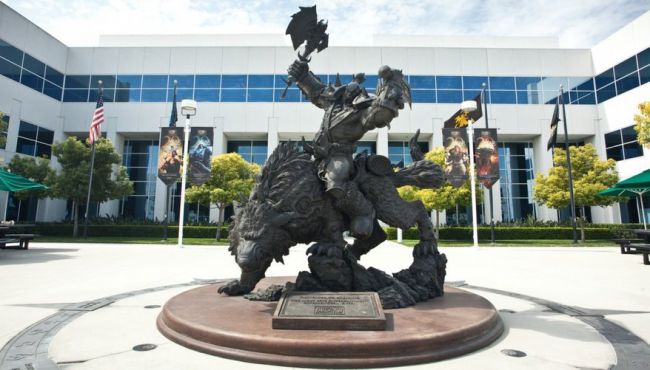Activision Blizzard pays employees to track their pregnancies
It also incentives other health tracking programs.

Activision Blizzard pays employees $1 per day in gift cards if they track their reproductive health via an app called Ovia—and the publisher can see some of its employees' data in an anonymized, statistical format.
"Employers who pay the apps’ developer, Ovia Health, can offer their workers a special version of the apps that relays their health data—in a 'de-identified,' aggregated form—to an internal employer website accessible by human resources personnel," reads a Washington Post report on the practice, which highlights Activision Blizzard as a proponent of employee health tracking.
Activision Blizzard also incentives Fitbit and other tracking among employees, including "mental health, sleep, diet, autism and cancer care," according to the article. Activision Blizzard VP of global benefits Milt Ezzard told the Post that the programs are popular.
The original reaction was "Hey, Activision Blizzard is Big Brother," said Ezzard, but now it's more "Hey, Activision Blizzard really is bringing me tools that can help me out." He also stressed that the programs are voluntary.
The reason Activision Blizzard wants employees to use the Ovia app? "I want them to have a healthy baby because it's great for our business experience," said Ezzard. "Rather than having a baby who's in the neonatal ICU, where she's not able to focus much on work." It's also about reducing the company's medical costs.
Ezzard's concern that infant illnesses will distract new mothers from work (where they would naturally be while their child is in an ICU) isn't out of the ordinary for a corporate executive, but reading it still makes me want to puke.
Beyond that, though, it's hard for me to believe that the best way to prevent preterm births and infant illnesses is an app that shares statistics with Activision Blizzard, and not access to excellent, private prenatal medical care and a low-stress environment.
Keep up to date with the most important stories and the best deals, as picked by the PC Gamer team.
Ovia claims its software works wonders. "Pregnant women who track themselves, the company says, will live healthier, feel more in control and be less likely to give birth prematurely or via a C-section, both of which cost more in medical bills—for the family and the employer," writes the Post. It also supposedly helps people conceive, and Ezzard told the paper that just under 20 women who were diagnosed as infertile have become pregnant since Activision Blizzard adopted the app.
It's a little weird that Ezzard knows how many women at Activision Blizzard were diagnosed as infertile, and the privacy concerns are obvious. While any data seen by Activision Blizzard is anonymized, there are only so many pregnant employees at the company at any given time—around 50 who use the app, apparently—and it seems likely that certain dots could be connected. According to Ezzard, however, the information is handled by "a third-party data warehouse" and is strictly controlled to prevent the re-identifying of employees.
Ovia told Kotaku that the data is only used to prove to the employer that the app is working—that is, saving them money—and that no "personal, intimate information" is shared.
Privacy aside, and without any judgment against employees who've accepted a little extra money to participate in these programs—money that's especially useful when having a child—I find any employer health monitoring disturbing. These programs aren't about caring for the wellness of employees and their families, but about further intruding on their lives outside of work to gain strategic data.
You can read the full article, which has more on the privacy concerns related to apps like this, as well as employer health tracking in general, over at The Washington Post.

Tyler grew up in Silicon Valley during the '80s and '90s, playing games like Zork and Arkanoid on early PCs. He was later captivated by Myst, SimCity, Civilization, Command & Conquer, all the shooters they call "boomer shooters" now, and PS1 classic Bushido Blade (that's right: he had Bleem!). Tyler joined PC Gamer in 2011, and today he's focused on the site's news coverage. His hobbies include amateur boxing and adding to his 1,200-plus hours in Rocket League.

